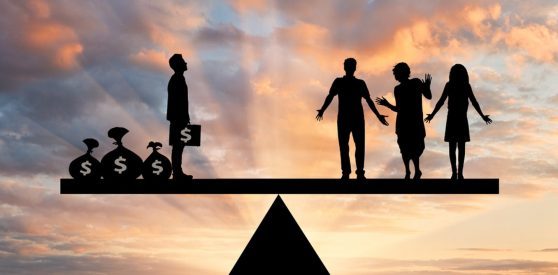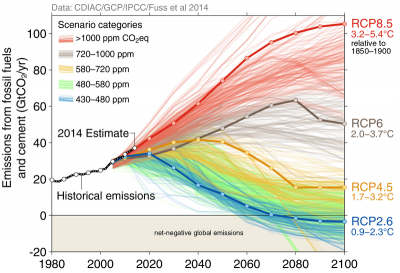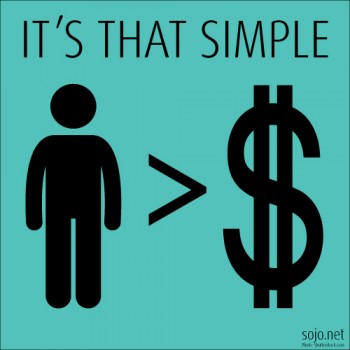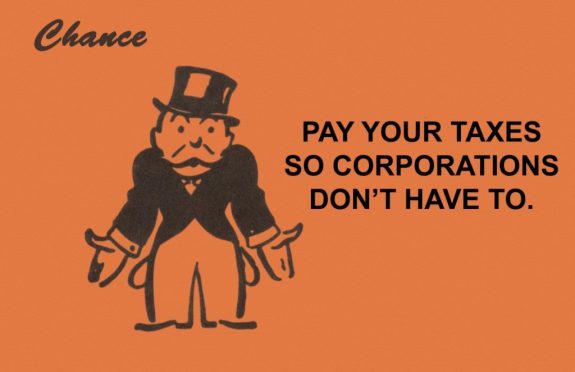“Human-induced climate change is real. The risks of inaction are real and mounting.” So Fairfax editorialised in this week’s papers. The gist of the article is that we still have time to mobilise and get our governments and policymakers to take real action on stymieing climate change. It is probably true, as the article claims, that we are witnessing a slowly dawning awareness of the Australian people and by the global economy. But by some measures, this is significantly too little – and way too late.
“Two degrees Celsius.” How many times have you heard the “two degrees” target proposed as the benchmark? Almost every popular media outlet, when writing about climate change (when they’re not claiming it isn’t happening or isn’t worth our attention) includes a statement like “We can still keep warming below two degrees, but we have to start now.” So we talk about carbon budgets. We talk about carbon capture and storage. We argue about the merits of a cap-and-trade system, an incentives system, a carbon tax – as if we still have time to compromise, time to experiment and find the ideal balance between maintaining our treasured social systems and the rescue of the global environment.
The current climate change narrative is based on a series of mistruths and falsities. We are told that we still have time to turn the ship around. The truth is that we do not.
We are told that two degrees is a hard and fast target, beyond which everything turns to disaster and before which we will be okay, if slightly uncomfortable. The truth is that there is no safe limit, that two degrees is not a magic number, and that two degrees is likely already beyond our prevention. The truth is that we have already emitted more than enough carbon to take us to two degrees and well beyond, and we’re showing no signs of slowing.
We are told that even if we go beyond two degrees, the disruption that results will come in the form of hurricanes and bushfires and rising tides. The truth is that while increased frequency and severity of hurricanes and bushfires will be a part of the outcomes of climate change, this is the merest tip of the iceberg. These visible disasters can be constrained and understood as freak occurrences that interrupt the status quo and from which we can recover. Less so is the permanent loss of arable land, the global starvation that may result, and potentially the tipping of our environment into a hellish morass incapable of supporting human life. That we are now seeing reputable sources raising the spectre of near-term human extinction in public narratives is telling of both how far the public discourse has gone ahead of public policy, and of the potential import of the fact that we’ve been so slow to act.
Whilst we have seen that the public and the media are far more accepting of the urgency of action on climate change than any of our leaders are willing to countenance, the public narrative is nevertheless generally years behind the science. Science has been telling us for the better part of a decade that two degrees is both insufficient and unattainable. Meanwhile the news media, and through them the general public, have been absorbed by the question of the reality of climate change, a question that climate researchers put to bed decades ago.
Only in the last few months have we started to see the global narrative start to catch up to reality, which is at the same time optimistic and disheartening. The truth that the media are slowly coming to understand is that two degrees might be possible, but not in the world that we know and live in now. As the media have finally started to catch on that yes, climate change is happening; yes, climate change is deadly serious; and no, we have not acted as quickly and as desperately as required; it begs the question. What is the current state of scientific understanding and how long will it take for the world to catch up to that?
An inevitable outcome?
There are reasons for the lag in public understanding. In years to come the placing of blame might become a hobby, but while attributing responsibility to various groups and individuals is easy, it is also simplistic. The long answer is that our inaction on climate change has been driven by the systems within which we work and live. These systems are well designed to order society and to offer freedom and opportunity to some. They are not effective, however, at providing for philanthropy. Our current systems of democracy and capitalism reward selfishness and self-interest and they pander to our genetic weaknesses. And the unstoppable forces of consumerism encourage and reward immediate gratification not only as a personal pleasure but a social good. The system requires us to buy and consume in order to sustain the order of things. More fundamentally, we need to buy and consume in order to feel good, and we are rewarded by a sense of accomplishment, we are rewarded by social approval and we are rewarded by endorphins. The same psychological tendencies that cause us to become fat and unfit also put barriers in our way to accepting bad news.
Bad news is a climate scientist’s stock in trade. Scientists are conservative by nature – they have to be. Crying wolf leads to a loss of respect and credence, and inevitably to a loss of funding. For a scientist or scientific organisation to decry an oncoming disaster, a high level of proof is required, and this takes time. The rumbling on the tracks isn’t enough: they need to be able to see the oncoming train’s lights before they’re willing to commit.
Scientists are not to blame for their reticence. One of the most constant criticisms of the IPCC’s work is not that the work is flawed, but that the resulting reports are universally conservative. They err on the side of caution. IPCC reports contain a range of projections, using a selection of different assumptions and resulting in very different outcomes, but they do not advise on the relative likelihood of being able to meet these curves. The effect is to allow policymakers to treat each projection as equally possible, and when one or more of the scenarios results in a temperature rise under two degrees, the opportunity arises to claim that this is still in reach. Scientists would say that the contents of the reports are reliable as a best-case scenarios, but that’s not how the reports are received in practice. The policy makers who must take IPCC reports into account largely consider them to be worst-case scenarios, and the urgency of the problem is diminished.
Tempting as it may be to do so, politicians also cannot be blamed for their inaction. Politicians are rewarded (in electoral popularity) for populist messages of hope and optimism. Politicians are punished, severely, for being the messenger that tells their people that they will have to make sacrifices (financial, creature comforts, lifestyle changes) for the sake of the public good. Far worse awaits those who attempt to impose these sacrifices. It is entirely reasonable to expect politicians to clutch at any straws offered, be they a possible solution that doesn’t carry electoral cost (e.g. direct action) or a skerrick of doubt about the science. In an environment filled with lobbyists arguing that there will be consequences to climate action, and think tanks and vested interests obscuring the science with manufactured doubt, motivated by a kind of economics that cannot afford to take climate change into account, it takes a special kind of political courage to take a stand. As we saw in the case of the 2013 election, all too often The People will punish such presumption.
We can’t even blame The People. The truth is that our evolution has not equipped us well to handle the kind of challenge that climate change presents. Humans are an immensely adaptable species, and when we cannot adjust our environment to suit our needs, we can adjust our own lifestyle to suit. However, we almost always need to be spurred into action. We evolved from hunter-gatherers who would gorge in the good times, in preparation for the long stretch of privation that would follow. At our core, we’re not prepared to leave the carcass on the ground.
Too little, too late
However it happens, whatever the cause, we are caught by it. Humanity is having a cook-out in a tunnel and we’ve ignored the rumblings underfoot for too long. It’s not until we see the lights of the oncoming train that we even start the engine of our getaway car and there’s no way we’re dodging this express train.
We read that we have, at most ten or fifteen years to turn the ship around. Here’s the thing, though: they told us this ten or fifteen years ago, too. If the problem was that urgent then, if the need for change was so pressing then, how can we still have a decade left to act now? The explanation is that the definition of “action” is changing. Climate scientists, pressured to give an optimistic outcome – to avoid calling “Game Over” – move the goalposts. They adopt increasingly unrealistic assumptions and expectations in their models of climate action. They invent ever more fanciful future technologies – magic bullets, couched in scientific-sounding terminology.
It is finally reaching the point where normal people – journalists, activists, even politicians – are calling them out on it. The likelihood of us being able to meet a trajectory to keep temperature increases below two degrees is presently somewhere between none and laughable. But so long as it is still technically possible to succeed at halting global warming, we keep hearing the “we still have time” message. So let’s have a look at what is actually required to stave off the kind of climate change that runs an even risk of killing every human on the planet.
http://www.carbonbrief.org/blog/2014/12/two-degrees-will-we-avoid-dangerous-climate-change/ : “In order to get back on track, emissions need to peak and then fall by between 40 and 70 per cent by 2050, the IPCC says, with unabated fossil fuel burning almost entirely phased out by 2100… That would require a never-before seen global effort to be sustained for a generation.”
http://www.vox.com/2015/5/15/8612113/truth-climate-change : “Holding temperature down under 2°C – the widely agreed upon target – would require an utterly unprecedented level of global mobilization and coordination, sustained over decades. There’s no sign of that happening, or reason to think it’s plausible anytime soon.”
http://www.newrepublic.com/article/119757/two-degrees-climate-change-no-longer-possible : “To be sure, the IPCC noted, it’s conceivable the world still could stay below that level – but only if governments immediately imposed stringent and internationally uniform carbon limits, and if a host of new low-carbon energy technologies proved able to scale up. Those are massive “ifs,” and though the IPCC wasn’t so impolite as to say so, there’s little to suggest that perfect trajectory will play out.”
In order to achieve the goal, humanity as a species must put aside national partisanship, untrammelled economic growth as a priority, and our current industrial machinery. Advanced economies must immediately and radically decarbonise their economies, at the same time as effectively building first-world economies in less advanced nations who would otherwise strive to catch up to “modern” standards of living via their own industrial revolutions. Humans in the affluent West must accept a curtailing of their profligate lifestyles and their aspirations.
Some have likened the effort required to the mobilization of the West in the early days of World War II, when entire economies were retooled to face an existential threat. But these similes were raised half a decade ago, and the problem has become even more dire since then. We must, as a species, put the good of the planet and the environment ahead of our own short-term interests. This is something that goes against our very nature.
But even our best intentions are not enough. At this point, there is enough carbon in the atmosphere to blow through two degrees and well beyond – potentially setting off the feedback loops and tipping points that bring us to a very final The End. In order to limit temperature rise to two degrees, current models include assumptions about negative carbon emissions – capturing carbon from the atmosphere and putting it into the ground or into trees. This requires either huge swathes of territory to be converted to forests – and only good, arable, important-for-feeding-seven-billion-humans land will do – or the widespread adoption of technology that doesn’t even exist yet.
Is it time yet to call game over?
You can’t get there from here.
There are a number of good reasons to declare “Game Over” on climate change.
Because there is a point beyond which hope becomes denial.
We see an example with Australian farmers in northern Queensland. Devastated by crippling floods in early 2013, it did not take long before large portions of Queensland were back in the Long Dry. By March 2014, the State’s largest ever drought had been declared, following the failure of the “wet season”. Drought is a largely artificial definition, designed primarily to enable governments to provide assistance to affected areas, predicated on the understanding that this is a “natural disaster” and will come to an end. The terminology of “drought”, at core, assumes that there is a normal state of being, and the lack of rain is an exception, an aberration, on par with storms or cyclones.
More than a year later, the rains have failed again and the drought has not broken – it has become worse. All this in advance of a predicted severe El Nino. The signs are not looking good for relief for our beleaguered Queensland farmers any time soon. And still we hear politicians State and Federal talking about drought assistance, of getting the farmers through the hard patch before the rains return.
According to my calculations, most of Queensland has been officially in drought for fifteen of the last twenty-five years. An El Nino can run for up to seven years, so we may be in for a significant period before the end of this cycle. If you’re living under drought conditions for more years than under wet conditions, can it really be called a drought any longer? At what point do we bow to the inevitable and admit that, rather than being a drought, this is the new normal? That climate change has made these areas untenable for ongoing agriculture? That continuing to support farmers with “drought assistance” is a never-ending battle that cannot be won?
Admitting defeat would mean the departure of farmers from these lands and force an alteration to the economy and markets of the State. It could be argued that reclassifying land as non-arable will destroy the lives of farmers trying to eke out a living on it, but it could as well be argued that those lives are destroyed anyway and farmers seeking support are modern-day King Canutes who will eventually have to move anyway.
Sometimes, it makes more sense to just admit defeat, rather than throwing good money after bad.
Because denial makes us focus on the actions that we need to take to win, rather than getting started on the actions required upon losing
As long as electors are told that two degrees is possible if only we find the right balance of punitive and reward policies the longer the policy debate remains mired in detail and technicality. It allows governments to hold out policies like Direct Action as a valid approach to climate change. It allows an ETS to include a variety of loopholes and concessions designed to protect vulnerable industries at the expense of the scheme’s effectiveness. This author has been a critic of the Greens’ approach to Labor’s ETS, scuttling a plan that might have gotten a foot in the door because it wasn’t ideal at the outset. But that was then, and this is now. It is far too late for half-measures. Unfortunately, we will never see full-strength climate policies as long as politicians can still argue that all will be well if we just cut our emissions by “five percent over 2000 levels”.
Because reality
If for no other reason, it might be valid to call an end to the charade of climate change action because it’s a colossal waste of time and money on the basis of a lie. It’s a lie, because none of those arguing loudly that we can still save the world are taking the next step and adding “only if we do what the world has never managed to do before and only if all the cards fall our way”. This is a lie of omission, and those telling it are often not even aware of it because they themselves have not been shown the sheer unlikelihood of what they’re proposing. If we reframe the argument in the appropriate terms, at least we can start talking about things with a sense of truth and reality rather than what we hope might be the case.
Reasons not to declare “Game Over”
Because it might not be
There may still be time – if atmospheric sensitivity is lower than modelled, and if we can invent and distribute carbon capture technology, and if the world radically reverses direction. Under the IPCC’s optimistic models, there is still time. Meeting these optimistic assumptions will be a heroic task, but we won’t get there if we don’t try and we won’t try if we’ve already thrown in the towel. An important first step would be the support of research into carbon capture / atmospheric cleaning technologies that will be absolutely fundamental to any kind of success from here.
Because it’s too important
“Declaring “game over” sends the message to those who’d be most harmed by climate change that they aren’t worth saving.” Our mythologies are full of humans in dire circumstances not giving up on hope. If there has ever been a cause around which the world could rally, that has the immediate threat to human survival on a global scale and the fortunes of small groups of people in specific, this is it. To give up on climate action is to give up on a large part of the world, raise the fences around the wagons and wait out the next great Human Extinction. Those most badly affected will be those who contributed to it the least and are least deserving. For the advanced nations to give up while there is still even the ghost of a chance is to add insult to lethal injury.
Because we need the urgency
We need urgency; we need the seriousness. There’s a fine line between panic-inducing immediacy and threat, and inertia-generating fatalism. World War II, in its size and ferocity and its immediacy, was enough to jolt the western world into action. We will see, over the next decade, increasingly dire climate outcomes. At some point, public attitudes and governmental policies will catch up with the exigencies of climate reality. The media and the government may always be a decade behind in understanding the threat, but action taken now on the basis of last decade’s threats will still have a beneficial effect on this decade’s crisis. We don’t know for sure that we can salvage the silverware, but we can be absolutely certain that nothing will survive if we stop fighting for it.
Because game over isn’t necessarily “game over”
We will miss two degrees – but the story doesn’t end there. “Everyone agrees on the general point — risks and damages keep piling up as the world gets hotter. So if the world can’t prevent 2°C of warming, it’s still a good idea to try and avoid 3°C of warming. If we can’t avoid 3°C of warming, it’s still a good idea to avoid 4°C. And so on.” The world doesn’t end at 2 degrees. Tipping points and reinforcing cycles may mean that the world is more fragile than it appears, but every extra degree of warming increases the inhospitability of our future world far more than the degree before it. If we can halt warming at three degrees, it’s still worth doing.
Because victory ain’t what it used to be
In the end, we may be forced to move the goalposts of what constitutes success. The two degrees scenario is aimed at preserving our current civilization. Restrain global warming to two degrees and we may be able to retain our present way of life, our creature comforts, our technology, and our populations. It may be – it probably is – too late for that: our world will change and our way of life must change to suit the new, hotter world we are creating.
But the end of our current, comfortable civilisation does not have to be the end of the human story. If the worst case scenarios are true, then the game is no longer about salvaging a world for our children: it is about salvaging a world for ANY children. If it is too late for current nation-states to survive, it’s not yet too late for modern life somewhere, somehow. If it becomes too late for capitalism as we know it, it’s not yet too late to preserve some kind of civilisation. If it is too late for us, it is not yet too late for humanity. We don’t know where we’ll end up, but however far beyond the point of no return we may have gone, we know that there is more road yet to travel. In the end, the best reason not to call Game Over – not to just stop trying and learn to love the bomb – is that there may yet be time to salvage some kind of future for some of us.
Just probably not all of us.
Like what we do at The AIMN?
You’ll like it even more knowing that your donation will help us to keep up the good fight.
Chuck in a few bucks and see just how far it goes!
Your contribution to help with the running costs of this site will be gratefully accepted.
You can donate through PayPal or credit card via the button below, or donate via bank transfer: BSB: 062500; A/c no: 10495969


















